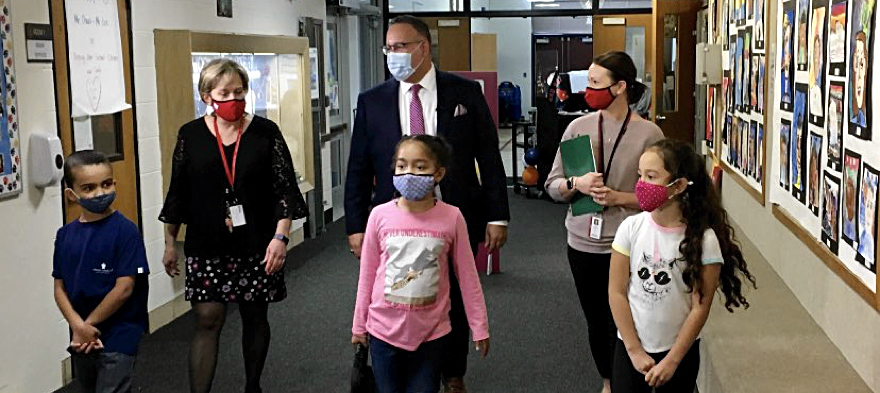
On Monday, Dr. Miguel Cardona became the twelfth U.S. Secretary of Education. Despite the amiable support afforded him by both sides of the aisle, we still don’t know much about Secretary Cardona. No one is questioning the quality of his credentials, nor is there concern about his commitment and enthusiasm to fix one of America’s most important problems: reopening schools. And, even after his Senate confirmation hearing, we still don’t know what stance he’ll take on school choice.
In response to questions about Washington DC’s Opportunity Scholarship program, Dr. Cardona stated his “passion really is to ensure quality schools,” and not to create “a system of winners and losers.” But that is the exact system created when choice is available to some families but not others. [pullquote position]Every student deserves the opportunity to access the education that best suits him or her, regardless of ZIP code.[/pullquote]
Dr. Cardona has made his goals very clear: to ensure a quality education to every student, to facilitate a healthy and safe transition back to in-person education, and to correct the “educational inequities” that exist along racial, economic, and social lines. For the following three reasons, in the mission to achieve these goals, [pullquote position="right"]Secretary Cardona’s Education Department and President Biden’s Administration should not just tolerate choice but embrace it.[/pullquote]
First of all, it’s the right thing to do. Limiting school choice to only some students will suppress high quality options for millions of families who deserve the opportunity to choose the education that best fits their student’s needs, regardless of their income level. This is especially true in the era of COVID-19 induced uncertainty. Students and parents are facing an unprecedented combination of academic, economic, health, and safety concerns associated with sending their kids back to school. Many find their current schools lacking in educational quality and were dissatisfied with distance education. Many students have fallen behind in their course curriculum. Some students are in need of additional help, and many will be unable to get it in their current situations.
Second, it's what’s best for students in both public schools and choice programs. In 2019, the Urban Institute conducted a study on students who enrolled in the Florida Tax Credit Scholarship Program. Seventy percent of scholarship recipients were Black or Hispanic, and the average recipient has a family income of only $32,385. The study found that graduating students are up to 99% more likely to go on to four-year college than a Florida public school student. On top of that, eleven different empirical studies found improved test scores for school choice enrollees. Twenty studies found that school choice by effect improved the academic outcomes of public schools. Finally, nine studies found that school choice positively helps fight racial segregation. The data clearly shows that school choice improves performance, graduation rates, and outcomes for kids.
Third, it’s what the people want. If the new administration won’t support school choice despite the evidence, then perhaps they’ll support it for the votes. According to polling data, 80% of public-school parents want school choice for their kids. Seventy-six percent of Republicans and 72% of Democrats want school choice for their kids. Families and students alike want the freedom to choose their education destiny.
[pullquote]School choice is equitable, has proven effective, is in demand by families, and, for me, is personal.[/pullquote] For ten years I was blessed to receive an amazing education through the help of the Florida Tax Credit Scholarship program. I’ve spent years in both public and private education, and my experience has shown that learning isn’t one size fits all. I needed the smaller classrooms that my private school provided, and I needed the close relationship with teachers and administrators. My education needs were met, and my success achieved because of a school choice opportunity. How many other kids are still waiting for theirs?
Secretary Cardona and the Biden administration have promised to listen to the evidence when making decisions to bring students back to in-person class. Will they listen to the evidence about school choice? They have promised to do what’s best for students. Will they listen to what they and their families want? Will they listen to those of us whose lives have been changed by the power of choice? For the sake of millions of children across America, I hope they do.
Nathaniel Cunneen is a Future Leaders Fellow with the American Federation for Children. He is a former recipient of the Florida Tax Credit Scholarship.
If you have a child with disabilities, you’re not alone: According to the latest data, over 7 million American schoolchildren — 14% of all students ages 3-21 — are classified as eligible for special...
The fight for educational equity has never been just about schools. The real North Star for this work is providing opportunities for each child to thrive into adulthood. This means that our advocacy...
The story you tell yourself about your own math ability tends to become true. This isn’t some Oprah aphorism about attracting what you want from the universe. Well, I guess it kind of is, but...
Your donations support the voices who challenge decision makers to provide the learning opportunities all children need to thrive.
Ed Post is the flagship website platform of brightbeam, a 501(c3) network of education activists and influencers demanding a better education and a brighter future for every child.
© 2020–2024 brightbeam. All rights reserved.